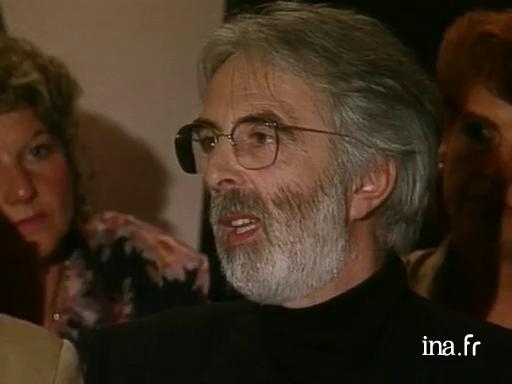Thierry Jousse
If I may be permitted to ask a question of Michael Haneke?
Michel Field
Please, you are home.
Thierry Jousse
I would like to know a little bit about why it is that you are interested every time over the course of three movies, in these news items?
What inspires you in this idea of news items which is in fact highly contemporary, but you have a particular treatment of it?
Michael Haneke
What is common to all of these films is precisely the fact that I chose news items.
There really is no logical, scientific or sociological explanation.
And cases of extreme violence such as those I retained for my films do not have a logical explanation.
It is pure violence, and it testifies of violence, of the brutality of our society, of the world in which we live.
That is what I wished to stigmatize, and it is true that I often address emotions.
I think that the spectator is more closely implicated, and it is the spectator who will feel constrained, forced to find an interpretation.
Michel Field
You really defend the fragmentary approach that extends even to the titles of your films.
It is a sort of, how to say, of position almost aesthetic or political, against a classical narrative form which on the contrary works on continuity and on a certain final elucidation by means of narrative?
Michael Haneke
It is true that in other arts like literature, it is almost a common area.
Life is presented in a such way that it resembles a copy, a reproduction, there is not always logic.
It is true that film, that cinema is somewhat the exception.
It is true that we have somewhat remained, I would say, in 19th Century culture and this form of expression is different.
And I grant particular important, I try to construct my polemic around this.
Michel Field
Thierry Jousse mentioned earlier that your camera is like a surveillance camera.
And that what is common to the three tomes of this trilogy "The Seventh Continent", and "Benny's video" being the two preceding films, is that there is always a use of images that are external to the cinema.
Television, video, as if you were finally in the filmmakers' circle, one thinks of Wim Wenders, Godard, who interrogated bit by bit what remains that is specific to the cinematic image in relation to other types of images.
Michael Haneke
Take for example our set tonight.
We are on a television set, and it is true that this set must represent what is happening here in Cannes.
There is a multiplicity, and to take this into account, to render the different aspects, one must I think use new methods.
Michel Field
A relationship with time also which you try to, to breathe into the set in relation to tele-visual timing, or publicity timing.
Finally you said that there was a sort of aesthetic and political component in the relationship with time, with film.
Michael Haneke
It is true that timing as you called it is very important, and it is perhaps the publicity that I think takes the stage and determined the presentation, the representation of time.
In other words, within a short lapse of time, there is a lot of information that must remain superficial.
And I think that the sensations, the emotions need time, more time.
Which is why I play with time in my works, in order to incite the spectator, not only to try and interpret but to really interiorize and then to keep the message.
It is not simply a matter of the spectator understanding what I wanted to say but that he create himself his own sensations, his own emotions.
Michel Field
You refuse all sociological or psychological explanations, notably the acts of this murderer, which in fact made me think a little of the Claire Denis film, because there was almost the same type of process that took place within a comparable news event.
It's to finally render...the critical aspect of your films, it is more that the spectator leaves your films with questions rather than with answers?
Michael Haneke
That is exactly right.
It is my intention that the spectator, when he leaves the cinema, asks himself questions, and it is true that there is a perennial guarantee of sorts.
The film, the subject will remain present in the spirit.
One must precisely avoid answering all the questions at the end of a film, because in the end it is a lie.
To draw forth questions, to ask questions, and then to respond to them is something that if very very unilateral.


















